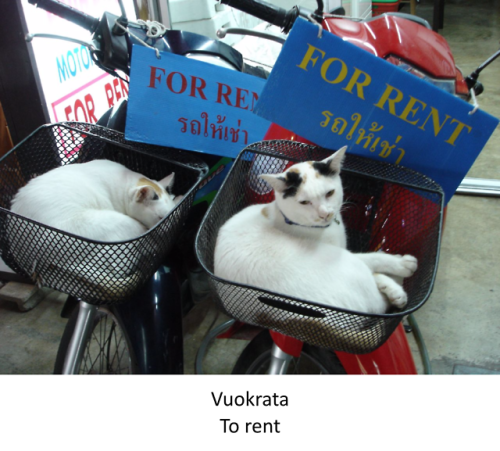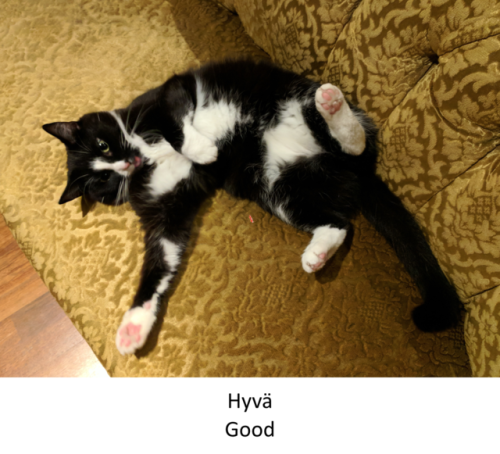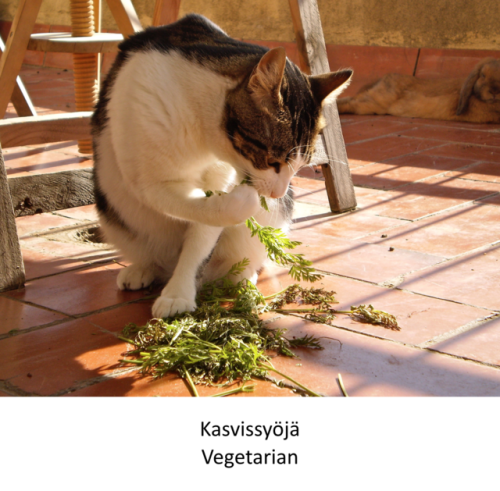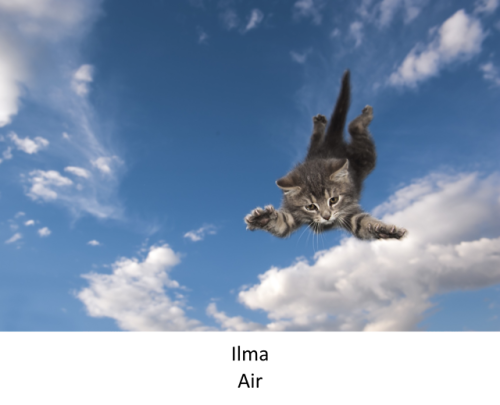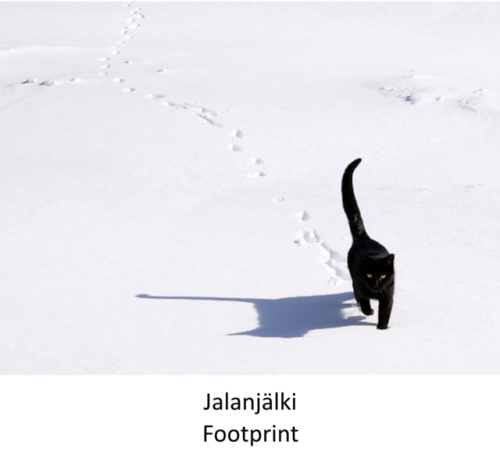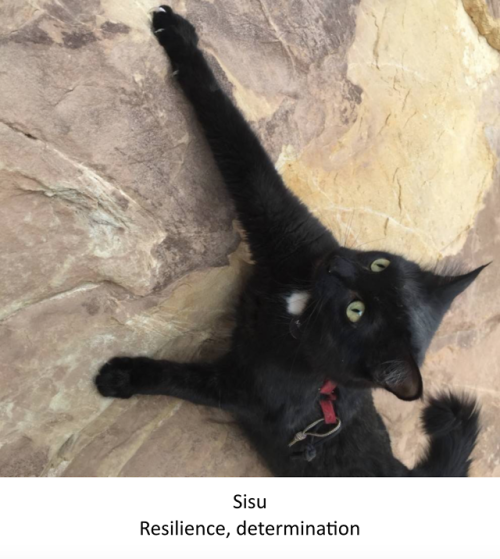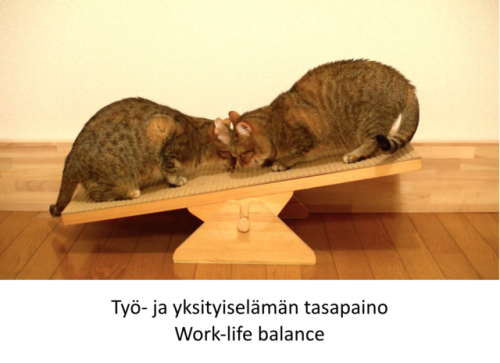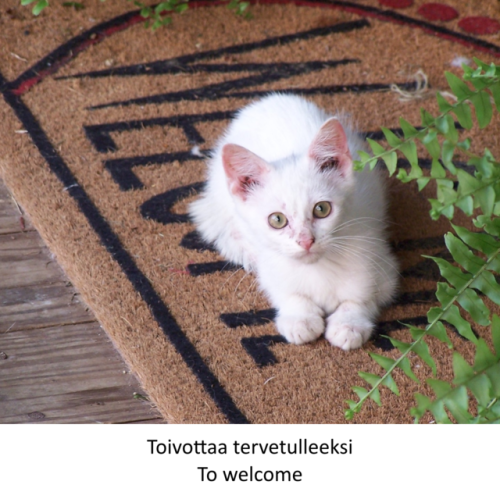#finnish
Verb of the day: nuohota
nuohota = to sweep a chimney
nuohooja = a chimney sweep (the person who does the cleaning)
nuohous = chimney sweeping
Nuohooja nuohoaa tulisijan ja hormin. = The chimney sweep will sweep the fireplace and the flue.
Ropina vs. rapina (both sounds)
ropina = patter (sound of rain drops on a roof)
Sade ropisee = Rain patters. [verb: ropista = to patter]
rapina = rustle (i.e. sound of a a mouse scratching about)
Hiiri rapisee = A mouse rustles. [verb: rapista = to rustle]
“Jos mikään huolestuttaa…” = “If anything is worrying ….”
In Finnish you can say: “If anything worries…” [which almost works in English but not quite directly translated]
Sinulla on puhelinnumero johon soittaa, jos mikään huolestuttaa. = You have the number to call, if anything is worrying you.
Mikään ei huolestuta minua. = Nothing is worrying me.
Verb of the day: loikata
loikata = to defect (to leave a country and give up citizenship for example for political reasons)
Pohjois-Koreasta loikannut mies kertoi kokemuksistaan. = The man who defected recalled his experiences.
Hän loikkasi Ruotsiin ja vaihtoi kansalaisuutta. = He defected to Sweden and changed citizenship.
Note: “loikata” also means “to leap”.
Yki-test resources
1. Jyväskylä university practice resources: http://ykitesti.solki.jyu.fi/tutustu-testiin/testifin/
2. Yle’s practice resources:
https://yle.fi/aihe/artikkeli/2015/12/15/keskitaso-0
3. Me VS. the Yki test blog:
https://joensuuletsfinnishthis.wordpress.com/
4. Uusi kielemme’s page on Yki test:
https://uusikielemme.fi/language-levels/yki-testi-when-are-you-ready-b1-1
5. Keski-taso resources from the Finnish Teacher:
http://www.thefinnishteacher.com/keskitaso.html
Verb of the day: olla jonkin kannalla
olla jonkin kannalla = to in support of something
Olen sen kannalla. = I support it.
Velan kannalla on nyt myös keskusta. = The centre party is also in support of the debt.
Olen tässä asiassa sinun kannallasi. = I am on your side regarding this issue.
Fire related words
takka = fireplace
varaava takka = heat retaining fireplace (i.e. fire box)
nuotio = campfire
kirves = ax
polttopuu (poltto = burning + puu = wood) = firewood
klapi = a piece of firewood (dialect word from Western Finland)
halko = a piece of firewood (bigger)
pilke = a piece of firewood (smaller, dialect word from Eastern Finland)
‘olla yhteydessä’ vs. 'ottaa yhteyttä’
The form “olla yhteydessä” can be with used with “mihin”-form OR “kanssa”:
olla yhteydessä jonkun kanssa = to be in contact with someone
Olin yhteydessä hänen kanssa. - I was in contact with him.
olla yhteydessä johonkuhun = to be in contact with someone
Voisitko olla yhteydessä minuun? - Could you get in touch with me?
Whereas “ottaa yhteyttä” only works with “mihin” form:
ottaa yhteyttä johonkuhun = to be in contact with someone
Otan yhteyttä häneen huomenna. = I’ll contact him tomorrow.
“rahkeet” (in the plural) = ability / capability / potential / skills
Often used with the verb “riittää” (to be enough, to be sufficient)
Unelmissani olen viuluvirtuoosi, vaikka rahkeet eivät oikeasti tähän riitäkään. = In my dreams I am a violin virtuoso, even though in reality I don’t have the potential for this.
Riittääkö joukkueen rahkeet pelin voittoon? = Does the team have the ability to win the game?
A question to other native Finns just out of curiosity: are there regional differences to using this word?
Sanakirja.org and Wiktionary give the same explanations as OP, but I could swear I’ve usually heard this being used to mean “to have guts” too. Urbaani Sanakirja also talks about rohkeus (bravery), which is exactly the emotion I usually connect with this word/phrase, and Finnish does have lots of words and sayings that can have slightly different meanings depending on where you are from/live.
I really can’t say, other than that I live in Eastern Finland and the context I saw it in was not having the ability.
I also noticed that it could be used in the context of not having the “guts” (at least based on urban dictionary), but no idea when/where that is the case.
There are quite a few cases where the meaning is different based on region like the word “kehdata”, but usually the words are so rarely written down it’s hard to find out other than asking people what it means to them (and then also where they are from).
Visit Finland has launched a new initiative through which you can rent a Finn to be your happiness guide during your travel in Finland. Sounds interesting! :)
If you wish to experience the balanced Finnish lifestyle with a local (free of charge!), you can send your application through this site until 14th April. You can read a bit more about this initiative here.
Note: the word “vuokrata” can also mean to let (as a landlord).
Post link
Finns have left their footprints in surprisingly many places all around the world.
Do you want to see some examples? Check out this article for that.
Post link
Finns are known for having something called “sisu”, which is a complex notion with no perfect translation available. Suggestions for the English equivalent of the word include resilience, perseverance, determination and guts among others, but none of these manage to convey the full meaning of sisu…
Read more about Finnish sisu and its meaning here.
Post link
Today is “Yrittäjän päivä” (entrepreneur’s day), when Finland celebrates its brilliant entrepreneurs, who have contributed significantly to the country throughout the last decades.
You can learn more about the day here.
Are you interested in becoming an entrepreneur in Finland? Here is a comprehensive online publication to support immigrant entrepreneurship.
Post link
Today is National Sleepyhead Day (”unikeonpäivä”) in Finland. The holiday itself has its roots in religion (originating from the legend of the Seven Sleepers of Ephesus), but nowadays it is a rather informal celebration. Traditionally, on this day, “sleepyheads” (people sleeping the longest) were woken up by using water, either by being thrown into the sea or a lake or by having water poured on them. The city of Naantali still observes this tradition as part of their grand sleepyhead festivities.
You can read more about the Finnish Sleepyhead Day here.
Post link

